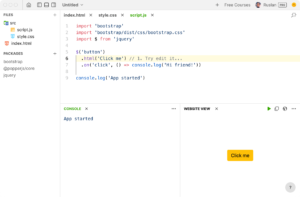Features in Online NodeJS Compilers
Amidst a world undergoing massive digital transformation, developers need tools that fit their dynamic lifestyle. Enter online node js compilers, eradicating the need for heavy-duty IDE installations and letting developers code and execute directly from their browsers.
They analyze the source code and perform various optimizations, such as dead code elimination, constant folding, inline expansion, and more. This helps ensure the best performance possible. They then generate machine code or bytecode that is specific to the underlying hardware architecture and can be executed by it.

Advanced features are also available, such as on-the-spot debugging (highlighting errors in real-time) and commanding loops to repeat tasks seamlessly, if/else statements to evaluate conditions, and functions to streamline your code for reusability. This means that even beginners can learn quickly and effectively with these powerful tools. As online nodejs compiler progress, they encounter a spectrum of challenges and opportunities that define their trajectory. Addressing these factors is crucial for maintaining relevance, fostering innovation, and ensuring a positive experience for developers.
Collaborative Features in Online NodeJS Compilers
One of the primary challenges lies in scaling projects within online compilers. As developers transition from small-scale experiments to larger, production-ready applications, compilers must seamlessly accommodate the increased complexity. This involves optimizing resource allocation, enhancing collaboration features, and providing robust tools for project organization.
The dynamic nature of technology introduces new paradigms, frameworks, and tools. Online Node.js compilers need to stay abreast of these developments and integrate seamlessly with emerging technologies. This includes compatibility with the latest JavaScript frameworks, support for new language features, and adaptation to evolving web standards.
Striking the right balance between customization options and user-friendliness is an ongoing challenge. While advanced users appreciate the ability to tailor their environments, ensuring that customization options do not overwhelm newcomers is crucial. Compiler interfaces should remain intuitive for beginners while offering depth for experienced developers seeking a personalized experience.
The learning landscape in web development is dynamic, with new methodologies and best practices emerging regularly. Online compilers must actively contribute to developers’ ongoing education by providing up-to-date tutorials, relevant learning resources, and interactive challenges that reflect the current industry trends.
With the increasing diversity of devices used by developers, ensuring a consistent and accessible experience across various platforms and screen sizes is essential. Responsive design and cross-browser compatibility become key factors in guaranteeing that developers can seamlessly transition between devices without sacrificing functionality.
The environmental impact of cloud-based services, including online compilers, is garnering attention. Compiler providers must consider adopting sustainable practices, optimizing energy consumption, and exploring eco-friendly hosting solutions. This commitment to environmental sustainability aligns with broader industry efforts to reduce the carbon footprint of digital services.
As challenges arise, they present opportunities for innovation, driving the evolution of online Node.js compilers to new heights. Innovations in collaborative coding can further enrich the development experience. Real-time pair programming, collaborative debugging sessions, and interactive code reviews are areas where online compilers can pioneer advancements. These features not only enhance teamwork but also create a more engaging and productive development environment.
The integration of artificial intelligence (AI) and machine learning tools holds immense potential. AI-driven code suggestion, intelligent error detection, and automated performance optimization are areas where online Node.js compilers can leverage AI to enhance developers’ efficiency and code quality.